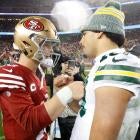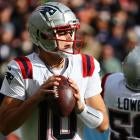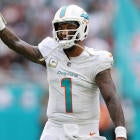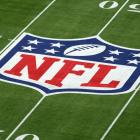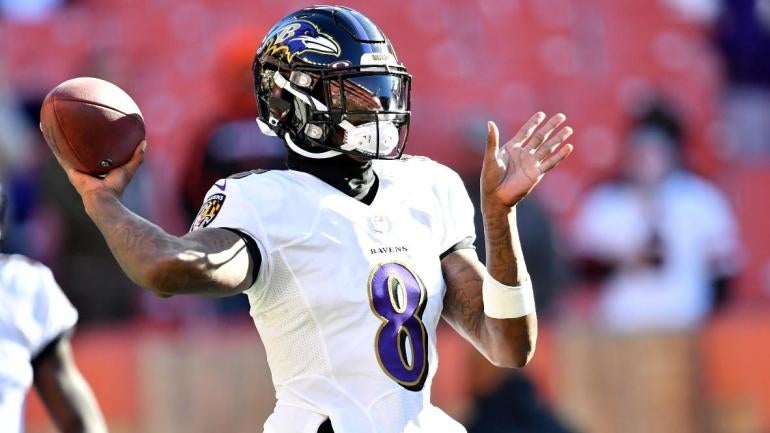
Quarterback Lamar Jackson joined the Ravens at this week's mandatory minicamp after skipping offseason workouts for the first time in his short NFL career. The 2018 first-round pick's attendance should put to rest any notion of acrimony between Jackson and the Ravens, or there could be a training camp holdout because of dissatisfaction with his contract.
Jackson is taking an unconventional approach to the business part of football. He is one of the few NFL players who has operated his entire career without an agent. The lack of an agent isn't expected to ultimately be an obstacle to Jackson becoming one of the league's highest-paid players. Cardinals wide receiver DeAndre Hopkins, Texans offensive tackle Laremy Tunsil and Rams inside linebacker Bobby Wagner have signed deals within the last three years that at the time set the market for their respective positions. Each had competent advisors to help with the process.
Jackson is in a contract year. He is scheduled to make $23.016 million this season on his fully guaranteed fifth-year option.
Unlike most players in a contract year, Jackson doesn't seem to have a sense of urgency about negotiating a new deal. During the NFL owners meetings at the end of March, Ravens owner Steve Bisciotti indicated the team was more interested in a contract extension than Jackson. "We'll pay him when he is ready," Bisciotti said. "… Eric (DeCosta) can't keep calling him and say, 'Hey Lamar, you really need to get in here and get this thing done." Bisciotti also suggested Jackson's obsession with winning a Super Bowl as a possible reason for the delay.
Jackson's patience is working out to his advantage financially. That's usually how things go with stars who are in their prime. Generally, the longer it takes to sign a Pro Bowl-caliber player who remains healthy, the more costly it becomes.
There were only three quarterbacks -- Josh Allen (Bills), Patrick Mahomes (Chiefs) and Dak Prescott (Cowboys) -- making at least $40 million per year when the offseason began. The number has grown to seven after Derek Carr, Aaron Rodgers, Matthew Stafford and Deshaun Watson landed mega deals with the Raiders, Packers, Rams and Browns, respectively.
Two of the new contracts, Watson's in particular, have been game changers. Once Rodgers, who was entering a contract year, decided he wanted to remain with the Packers rather than try to force a trade, he became the NFL's first $50 million-per-year player in March. His new contract is widely considered to be $150.815 million over three years, although there are two additional below-market years in the deal.
Rodgers established new standards for guaranteed money in football contracts with $150.665 million in total guarantees and $101.515 million fully guaranteed. That was until the Texans traded Watson to the Browns a couple of weeks later.
Nobody expected Watson to get a fully guaranteed, five-year, $230 million contract in connection with his trade, especially considering the sexual assault and misconduct allegations he's still facing. Watson had four years worth $136 million remaining on the four-year contract extension, averaging $39 million per year, he signed in September 2020. He has the type of guaranteed money typically reserved for the most lucrative NBA contracts. For example, Bucks forward Giannis Antetokounmpo, the 2019 and 2020 NBA MVP, signed a five-year extension in December 2020 that took effect this season worth a fully guaranteed $228,200,420.
Bisciotti acknowledged the potential impact of Watson's contract at those owners meetings. "I wish they hadn't guaranteed the whole contract," Bisciotti said. "I don't know that he should've been the first guy to get a full guaranteed contract. To me, that's something that's groundbreaking, and it'll make negotiations harder with others." He also added, "but it doesn't necessarily mean that we have to play that game, you know? We shall see."
Jackson would be justified in seeking a fully guaranteed deal similar to Watson's. He is the greatest dual-threat quarterback in NFL history. Jackson established a new single-season quarterback rushing record with 1,206 yards on the ground and led the NFL with 36 touchdown passes in 2019 when he was league MVP. He was also the first player to have at least 3,000 passing yards and 1,000 rushing yards in the same season.
Watson has never been an All-Pro, let alone NFL MVP. There also aren't any concerns about Jackson's off-the-field behavior.
Jackson's last two seasons haven't been at that same level as his MVP year. In 2021, Jackson threw a career-high 13 interceptions and was sacked 38 times, the most of his career in a season, during the 12 games he played. As the season progressed, teams began blitzing Jackson with increasing frequency because of the success they were having.
There were mitigating factors to the 2021 performance. The offensive line and running game were decimated by injury. Baltimore's top three running backs -- J.K. Dobbins, Gus Edwards and Justice Hill -- didn't play a down last season, and 2019 All-Pro left tackle Ronnie Stanley only played in the season opener in his attempt to return from a serious ankle injury he suffered during the 2020 season.
Despite the makeshift offensive line and running game, the Ravens were leading the AFC North with an 8-5 record, primarily thanks to Jackson, when he was sidelined for the final four games of the season with a right ankle injury. Baltimore didn't win another game without him. In some respects, the Ravens gained some insight last season as to whether Jackson could carry the franchise under less than optimal or adverse circumstances.
Jackson has received plenty of criticism about his ability as a passer, particularly in the pocket. Any shortcomings Jackson may have throwing the football are unlikely to prevent him from getting paid near the top of the quarterback market. The Falcons made Michael Vick, who was the first quarterback to rush for 1,000 yards in a season, the league's second-highest-paid player in 2004, although he wasn't a polished passer.

Pick Six Newsletter
Crafted By The Best NFL Experts
Get the day's big stories + fun stuff you love like mock drafts, picks and power rankings.
Thanks for signing up!
Keep an eye on your inbox.
Sorry!
There was an error processing your subscription.
The Ravens will be facing a choice on which franchise designation to place on Jackson if he plays out his rookie contract. There have been reports that Jackson isn't afraid of playing the franchise tag game.
The Ravens avoided the franchise tag game with Joe Flacco in 2013 when his contract was expiring. Flacco was able to parlay an amazing 2012 playoffs, in which the Ravens won Super Bowl XLVII, into a six-year, $120.6 million deal, averaging $20.1 million per year that briefly made him the league's highest-paid player. He had been a slightly above-average quarterback at best in the previous seasons prior to his stellar postseason. By contrast, Jackson demonstrated he can perform at the highest level, but the Ravens have only won one playoff game with him.
Generally, quarterbacks are rarely in a position to be franchised because new deals are usually in place well before the decision needs to be made. In the last 10 offseasons, only three quarterbacks -- Drew Brees (2012), Kirk Cousins (2016 and 2017) and Prescott (2020 and 2021) -- have been designated as franchise players.
There are two types of franchise designations: non-exclusive and exclusive. The non-exclusive tag allows a player to negotiate with other NFL teams, but if he signs an offer sheet with another club, his team has five days to match the offer. If the offer is not matched, his team will receive two first-round picks as compensation from the signing team. The non-exclusive franchise tag for quarterbacks next year should be 14.212% of the 2023 salary cap, which should put the number in the $32 million neighborhood.
The non-exclusive tag could make the Ravens vulnerable to an offer sheet by a quarterback-needy team with an abundance of salary cap room that might be difficult to match. The two first-round picks for Jackson would be considered a good value relative to the trade compensation for upper-echelon quarterbacks this offseason. The Texans dealt Watson and a 2024 sixth-round pick for 2022, 2023 and 2024 first-round picks, a 2022 fourth-round pick, a 2023 third-round pick and a 2024 fourth-round pick. The Broncos acquired Russell Wilson and a 2022 fourth-round pick from the Seahawks for multiple players (tight end Noah Fant, defensive lineman Shelby Harris and quarterback Drew Lock), 2022 and 2023 first-round picks, 2022 and 2023 second-round picks and a 2022 fifth-round pick.
Four of the five times quarterbacks were designated as franchise players since 2012, the exclusive version was used. A player cannot negotiate with other teams with the exclusive franchise tag. The 2023 quarterback exclusive franchise number will be the average of the top five 2023 quarterback salaries (salary cap numbers with some minor adjustments) at the end of next year's restricted free agent signing period on April 21. It currently projects to $45.648 million. This number is subject to change depending on new quarterback deals, contract restructures, pay cuts and/or releases between now and then.
A second franchise tag in 2024 at an NFL Collective Bargaining Agreement-mandated 20% increase over Jackson's projected 2023 exclusive number would be just over $54.775 million. Baltimore designating Jackson as a franchise player in 2025 for a third consecutive year would be cost prohibitive. A third and final franchise tag with a 44% increase over the 2024 figure would be just under $79 million.
A willingness by Jackson to embrace franchise tags should give him ammunition to seek a long-term contract in the $50 million-per-year neighborhood. The average of franchising Jackson for two years currently projects to slightly over $50.2 million per year. Baltimore balking at this type of money would allow Jackson to test the open market in 2025 after making a little more than $100 million on two franchise tags.
Jackson would have to be comfortable with assuming the risk of injury with a year-to-year approach. Some believe his playing style makes him more susceptible to injury. The 709 times Jackson has been hit since taking over as the Ravens starting quarterback midway during his rookie year in 2018 are 99 more than any other quarterback during this span.
An injury may not have a significant impact on Jackson's financial prospects. A gruesome season-ending ankle injury early in 2020, which sidelined Prescott for the final 11 games when he was playing on a $31.409 million franchise tag, didn't stop him from becoming the NFL's second $40 million-per-year player in 2021.
There should already be plenty of information in marketplace for an agreement to be reached once there are serious contract discussions. The biggest sticking point might be over a fully guaranteed contract.
A compromise might be the shorter-term contract route that Cousins took as an unrestricted free agent in 2018. Cousins broke new ground by signing the NFL's first lucrative, fully guaranteed veteran contract with the Vikings. His three-year, $84 million deal, which made him the league's highest-paid player at $28 million per year, was worth up to $90 million with incentives.
For Jackson, this could mean three fully guaranteed years worth $135 million to $150 million averaging between $45 million per year and $50 million per year. Jackson would get his security while the Ravens would be on the hook for 60% to 65% of the money the Browns are with Watson. It would probably make sense for Jackson to insist on a clause preventing the Ravens from using a franchise or transition tag on him after the expiration of his contract to ensure maximum leverage in any subsequent contract-extension talks.











